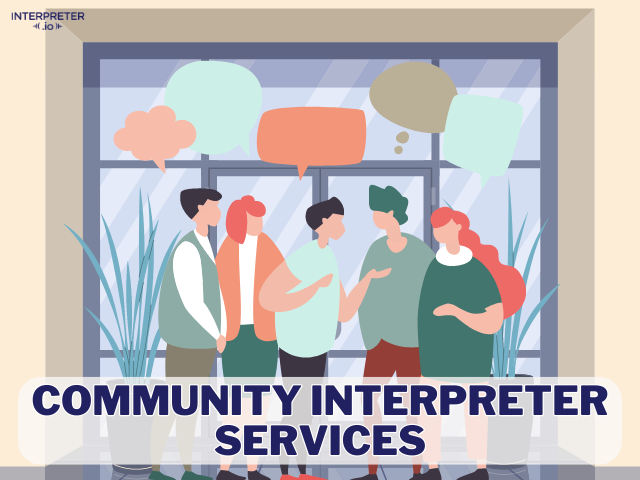Community Interpreter Services: Facilitating Local Engagement
 Language plays a crucial role in cultural identity across the globe. As technological advancements foster more global connections, the interaction between diverse groups and their cultures intensifies.
Language plays a crucial role in cultural identity across the globe. As technological advancements foster more global connections, the interaction between diverse groups and their cultures intensifies.
This growing exchange highlights the need for interpreters, who help people speaking different languages understand each other. The variety of languages across cultures often creates significant communication barriers. Interpreters play a crucial role in overcoming these obstacles, enabling smoother interactions and fostering better relationships among communities.
Understanding Community Interpreter Services
Community interpreter services help people from different language backgrounds communicate effectively. They make sure everyone in the community, no matter their native language, can access important information and take part in daily life.
These services are especially important in areas like healthcare, legal issues, education, and social services, where clear communication can make a big difference. Interpreters bridge the language gap, helping communities work and grow together.
What Are Community Interpreter Services?
 Community interpreters specialize in bridging the language gaps between individuals and the services they need. They work on-site or remotely to translate spoken or signed language in real-time
Community interpreters specialize in bridging the language gaps between individuals and the services they need. They work on-site or remotely to translate spoken or signed language in real-time
Unlike translators, who deal with written text, interpreters work with live communication, making their role both dynamic and immediate.
The Importance of Effective Communication in Diverse Communities
Effective communication is the foundation of any strong community. It ensures that all community members can engage with each other and with local services in a meaningful way.
Without it, people who do not speak the dominant language may find themselves excluded from critical discussions and decisions that affect their lives.
Community interpreter services strive to prevent this exclusion by providing accurate and respectful interpreting, helping to maintain harmony and mutual understanding in diverse settings.
The value of these services extends beyond just facilitating transactions or conversations. They help build trust between service providers and recipients, which is crucial for the successful delivery of many community-based services.
Community interpreter services also support cultural competence among service providers by helping them communicate in culturally appropriate ways. This is critical because effective communication must respect cultural differences and consider the cultural context of the information shared.
Key Services Provided by Community Interpreters
Community interpreter services are essential in ensuring clear communication across various sectors. Here, we explore the fundamental services they offer, providing a straightforward look at how these professionals make a practical impact in everyday situations.
Face-to-Face Interpreting
This method is the most traditional form of interpreting, requiring the interpreter to be physically present. It is particularly valuable during sensitive interactions where tone and body language are significant.
Medical appointments, legal consultations, and social service meetings are common places where face-to-face interpreters are indispensable. The direct interaction helps prevent misunderstandings that might occur due to non-verbal cues.
Over-the-Phone Interpreting
Over-the-phone interpreting is a flexible and cost-effective option that allows for immediate response without the need for the interpreter to travel. This service is often used in customer service for businesses, emergency calls, and preliminary medical consultations where quick communication is essential.
It enables service providers to offer immediate assistance, ensuring that language barriers do not delay critical information exchange.
Video Remote Interpreting
Integrating the visual benefits of face-to-face interpreting with the convenience of remote service, video remote interpreting (VRI) uses video telecommunication systems to provide interpreting services.
This method is particularly useful in hospitals and clinics where the interpreter can see the participants and provide a more accurate interpretation.
It is also used in educational settings, allowing interpreters to assist in classrooms without being physically present, thereby supporting students who require language assistance without disrupting the class dynamic.
How Interpreter Management Software Helps
Interpreter management software is a powerful tool that enhances the efficiency and effectiveness of community interpreter services. By streamlining processes, it allows organizations to manage interpreters, schedules, and assignments more effectively, ensuring seamless service delivery. Here's how it helps:
Streamlined Scheduling and Assignments
Interpreter management software automates scheduling, ensuring interpreters are assigned based on availability, location, and required language skills. This reduces manual work and helps prevent double bookings or scheduling conflicts.
Improved Communication
The software provides a centralized platform for communication between service providers, interpreters, and clients. This ensures that all parties have access to real-time updates and can coordinate effectively.
Enhanced Resource Allocation
With detailed analytics and reporting, organizations can better allocate resources, identifying gaps in interpreter availability or demand for specific languages. This ensures that critical services are always covered.
Cost Efficiency
By reducing administrative tasks and optimizing scheduling, interpreter management software minimizes operational costs while maintaining high service quality.
Remote and On-Site Support
Modern platforms integrate remote interpreting options, such as video remote interpreting (VRI) and over-the-phone interpreting (OPI), ensuring accessibility even in urgent situations or areas with limited interpreter availability.
Compliance and Record Keeping
Interpreter management software ensures that all interactions are logged, helping organizations maintain compliance with legal and regulatory requirements. This is particularly important in sectors like healthcare and legal services.
Areas Where Community Interpreters Shine
Community interpreters play a crucial role in several key areas of public and private life. Their expertise and skills are particularly valuable in sectors where clear and precise communication is essential.
Healthcare
In healthcare settings, the presence of interpreters can significantly impact patient outcomes. They ensure that all patients, regardless of their language abilities, receive the correct information about their health conditions.
This is critical for informed consent and for patients’ ability to follow treatment plans accurately.
For instance, during medical appointments, interpreters translate complex medical jargon into the patient's language, which helps in reducing misunderstandings and improves patient compliance.
Legal Systems
In the realm of law, interpreters are indispensable. Their work supports the legal system’s foundational principle that every individual deserves a fair trial. They assist in various legal proceedings, including court hearings, depositions, and client meetings, ensuring that non-English speakers understand their rights and the legal processes involved. This role is vital in preventing miscarriages of justice and in maintaining the integrity of legal outcomes.
Educational Settings
Education is another critical area where interpreters make a significant difference. They facilitate communication between educators and students who are non-English speakers, as well as their families.
This support helps students to participate fully in their educational experiences, which is vital for academic success and social integration.
Interpreters assist in parent-teacher conferences, educational planning meetings, and other school-related activities, ensuring that all parties are on the same page.
Social Services
Interpreters also extend their services to social service agencies, where they help individuals and families access community resources and government assistance.
By providing interpretation for these services, they ensure that non-English speaking community members understand and utilize available support, such as housing aid, food security programs, and employment services.
This role is essential in helping individuals navigate through their immediate needs and in fostering long-term well-being in the community.
This is fundamental to building strong, inclusive communities where every member has the opportunity to participate fully and benefit from all available resources. By continuing to support and expand these services, communities can become more cohesive and resilient.
Clear and easy communication is important for building communities where everyone can take part and access the services they need. Interpreters help bridge language gaps, supported by tools like interpreter management software that make their work more effective.
Solutions like Interpreter IO simplify scheduling and resource management, helping organizations meet diverse language needs. Supporting interpreters and the tools they use creates stronger, more inclusive communities.
Want to break language barriers in your community? Visit Interpreter IO today to see how our services can help you build a more connected and inclusive community.
